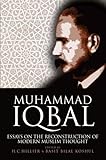Muhammad Iqbal : Essays on the Reconstruction of Modern Muslim Thought / Chad Hillier, Basit Koshul.
Material type: TextPublisher: Edinburgh : Edinburgh University Press, [2022]Copyright date: ©2015Description: 1 online resource (256 p.)Content type:
TextPublisher: Edinburgh : Edinburgh University Press, [2022]Copyright date: ©2015Description: 1 online resource (256 p.)Content type: - 9780748695416
- 9780748695423
- 181.07
- B5129.I6.M84 2015
- online - DeGruyter
- Issued also in print.
| Item type | Current library | Call number | URL | Status | Notes | Barcode | |
|---|---|---|---|---|---|---|---|
 eBook
eBook
|
Biblioteca "Angelicum" Pont. Univ. S.Tommaso d'Aquino Nuvola online | online - DeGruyter (Browse shelf(Opens below)) | Online access | Not for loan (Accesso limitato) | Accesso per gli utenti autorizzati / Access for authorized users | (dgr)9780748695423 |
Frontmatter -- Contents -- Preface -- 1 Introduction -- 2 The Human Person in Iqbal's Thought -- 3 Achieving Humanity: Convergence between Henri Bergson and Muhammad Iqbal -- 4 The Contemporary Relevance of Muhammad Iqbal -- 5 Pragmatism and Islam in Peirce and Iqbal: The Metaphysics of Emergent Mind -- 6 Between Hegel and Rumi: Iqbal's Contrapuntal Encounters with the Islamic Philosophical Traditions -- 7 Reconstructing Islam in a Post-metaphysical Age: Muhammad Iqbal's Interpretation of Immortality -- 8 Iqbal, Bergson and the Reconstruction of the Divine Nexus in Political Thought -- 9 Muhammad Iqbal: Restoring Muslim Dignity through Poetry, Philosophy and Religious Political Action -- Index
restricted access online access with authorization star
http://purl.org/coar/access_right/c_16ec
Examines the ideas central to Muhammad Iqbal's thought and life: religion, science, metaphysics and nationalismThere are few moments in human history where the forces of religion, culture and politics converge to produce some of the most significant philosophical ideas in the world. India in the early 20th century saw one of these moments with the rise of activist-thinkers like Nehru, Jinnah and Gandhi, individuals who not only liberated human lives but their minds as well. One of most influential members of that group was the poet-philosopher Muhammad Iqbal. Commonly known as the 'spiritual father of Pakistan', the philosophical and political ideas of Iqbal not only shaped the face of Indian Muslim nationalism but also the direction of modernist reformist Islam around the world.New developments in research on Iqbal's thought are collected here, coming from a range of prominent and emerging voices from political science, philosophy and religious studies. They offer new and novel examinations of the ideas that lie at the heart of Iqbal's own thought: religion, science, metaphysics, nationalism and religious identity. Readers will (re)discover many new connections between the 'Sage of the Ummah' and the greatest thinkers and ideas of European and Islamic philosophies.Key FeaturesResponds to the renewed interest in Iqbal by developing new interpretations and understandingsProvides an examination of ideas central to Iqbal's thought including the connection between religious belief and modern knowledge, the expression of Islamic belief through modern concepts, the political dimension of Muslim identityExplores the links between Iqbal and other European philosophers who were his contemporaries including Bergson, Peirce, and Whitehead
Issued also in print.
Mode of access: Internet via World Wide Web.
In English.
Description based on online resource; title from PDF title page (publisher's Web site, viewed 02. Mrz 2022)


